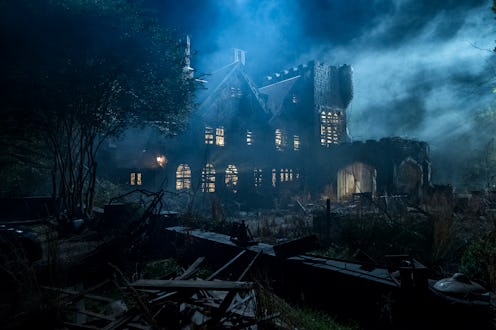Entertainment
The Real Inspiration For 'The Haunting Of Hill House' Is Scarier Than Any Ghost Story

Do you believe in ghosts? The answer to that question will likely inform your opinion on whether or not Netflix's new horror series The Haunting Of Hill House is based on a true story. The disbelievers among us will scoff at the very idea that the spooky ghost story could be inspired by actual events; others may be dying to know which real-life haunted house it's based on so they can visit and experience some paranormal activity themselves.
There is a long tradition of haunted house movies being at least loosely inspired by "real" hauntings. Perhaps the most famous of those is the 1979 classic The Amityville Horror, supposedly based on events that happened to the Lutz family in their upstate New York home. More recently, both The Conjuring and The Conjuring 2 took inspiration from the case files of real-life paranormal investigators Ed and Lorraine Warren — the same couple who investigated the haunting in Amityville.
Of course, whether you think any of that qualifies as a "true" story is up to you — but these are stories that at least find their foundations in things that happened to real, tangible people. So is The Haunting Of Hill House like those stories? Or is it an original creation?
As it turns out, the Netflix series does have very famous source material... but not of the historical variety. Rather, The Haunting Of Hill House is based on the classic 1959 novel of the same name by horror author Shirley Jackson. Hill House has been adapted for the screen twice before, both times in the form of feature films: first in 1963, as directed by Robert Wise (The Sound Of Music) and again in 1999, in a version starring Liam Neeson, Catherine Zeta-Jones, Owen Wilson, and Lili Taylor.
While both of those adaptations were given the short and simple title The Haunting, this new reimagining of Jackson's tale gives the story its full and proper name. Even so, it actually borrows the least from the source material, "taking a contemporary, character-based approach that carries little over from Shirley Jackson's original novel," according to the A.V. Club's review of the series. "Yet," writer Katie Rife continues, this new version "still feels in the spirit of the book," so Jackson acolytes shouldn't be too upset.
That being said, just because Hill House is based on a book rather than on real-life events doesn't mean it doesn't carry any authenticity. In fact, the novel itself appears to have had many inspirations both historical and personal. According to Ruth Franklin's 2016 biography of the author, Shirley Jackson: A Rather Haunted Life, the Crain mansion in Jackson's book was inspired by several real-life buildings — among them the Winchester Mystery House in San Jose, California, which was itself the subject of horror movie Winchester earlier this year.
Ultimately, Hill House's greatest inspiration may have been the most haunted of all places: the human mind. "Houses aren't haunted — people are," horror author (and Stephen King's son) Joe Hill told The Guardian in a recent article about Jackson and her influence on the genre. "All the most terrible spectres are already there inside your head, just waiting for the cellar door of the subconscious to spring open so they can get out, sink their icy claws into you. In the story, the house toys with the minds of our heroes just like the cat with the mouse: with a fascinated, joyful cruelty. Nothing is more terrifying than being betrayed by your own senses and psyche."
It's possible, then, that Jackson's own demons helped shape the emotional core of Hill House, especially in regard to the loneliness of protagonist Eleanor Vance. "You once wrote me a letter telling me that I would never be lonely again. I think that was the first, the most dreadful, lie you ever told me," she wrote in a letter to her estranged husband around the time she started working on Hill House, according to The New York Times.
Sometimes the scariest ghosts aren't the ones flitting about crumbling stately manors, but the ones inside our own heads.